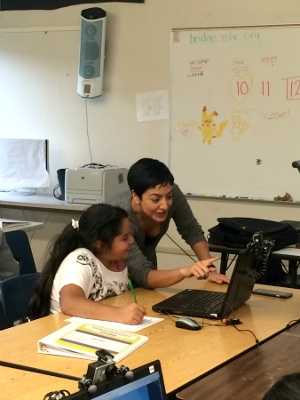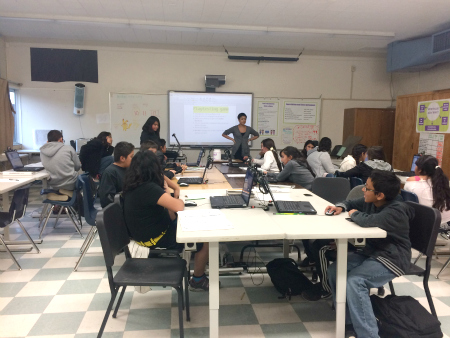In their words: Yethzéll Díaz

Yethzéll Díaz works as a research assistant for ETS. For one the studies she is involved with, she teaches a video game programming class at a middle school.
What are you doing now?
I currently work for an organization in Scotts Valley called ETR (Education, Training, Research) as a member of the Diversity in IT research team. We do a variety of research studies that work to increase the opportunities for underrepresented populations in the STEM world. For example, in one longitudinal study we are looking at how the relationship between Latina mothers and their children influence Math attitudes and outcomes over the course of two years during the child’s transition from elementary to middle school.
In another study we are looking at how pair programming (when two people work together on a computer) can be a tool for fostering what we’re calling “intrepid exploration.” The idea here is to explore environments that engage middle school-aged children in Computer Science. I really love research and see it as an invaluable tool for empowering individuals in their daily lives and informing change-creators and decision-makers. It’s been a blast getting to experience how an idea can be explored to potentially create whole new ways for people to work towards their goals!
What is it life like now you've graduated?
Life is good. I went back and forth in the struggle to decide whether my next step should be to go back home and contribute to my community or stay here and take advantage of the opportunities to engage in the field that I’m passionate about. I ultimately ended up choosing to spend some time learning first-hand how to use research as tool to empower communities and hope that this will translate into the change I hope to see in my own home community.
Aside from that, I can’t complain about living in beautiful Santa Cruz. I feel fortunate to get to live in a place that is so different from home—it keeps me grounded and challenges me to grow every day.
How did your UCSC education help you with what you are doing now?
My UCSC education, specifically my participation in the Everett Program, was invaluable for what I am doing now. That organization gave me the opportunity to plant my education and my ideas in a real, meaningful way and challenged me to apply concepts I was learning in the classroom to projects that I, along with a diverse group of highly motivated students, truly cared about.
The Everett Program along with the vision and dynamism of the Latin American/ Latino Studies department really gave me the fuel to pursue my interests.
What does social justice mean to you?
Social justice is a dynamic and continuously changing concept. I don’t think it’s something that is achieved, rather it is something we continuously work toward in an effort to never be satisfied with “good enough.” It is something that each and every one of us is uniquely equipped to contribute to and shape. Social justice is about being willing to challenge ourselves to consider other people’s lived experiences and to take action when we can.
How do you try to make a difference?
In my work now, the most important way I am making a difference is by building upon the hard work, sacrifices and values of the generations before me in order to ensure that voices from marginalized/underrepresented communities are represented in the work that informs the knowledge-formation process.
What are your plans for the future?
I never want to stop learning. Whether that means continuing my education in grad school or exploring new opportunities through an increasingly interconnected world, I plan to continue to challenge myself to explore new worlds, never be completely comfortable (where’s the fun in that?) and think of ways that my work can shed light on the value and contributions that communities have to make that aren’t captured by traditional systems of measurement.
What advice to you have to current students who want to create social change?
Never fool yourself into thinking that you yourself are the missing ingredient that is going to solve “the problem.” You have to be willing to de-center yourself from what it is you believe in. Social change is a movement of people willing to work together toward an idea that is shaped in intelligent, relevant ways and in a timely manner. It’s about taking action when it matters and in ways that people are able to hear.
Do you have any words of reflection about being a Zimmerman scholarship recipient and how the scholarship helped you?
I remember that as the inaugural recipient of the scholarship, I felt completely overwhelmed. I was in the midst of searching for what it was that I truly cared about and yet here I was being presented with an award. I felt unworthy because I didn’t think I’d actually done anything yet. But it was through discovering who Gabe was and what his story meant to so many who knew him that I understood that it was the journey towards social justice and a life that represented it that was being celebrated. The scholarship helped me to understand and see the value of being willing to pursue something that I believed in and the power of dedicated people to create meaningful change.
